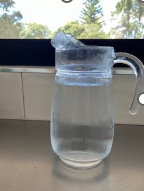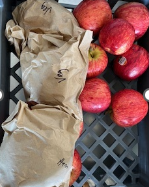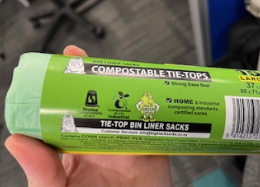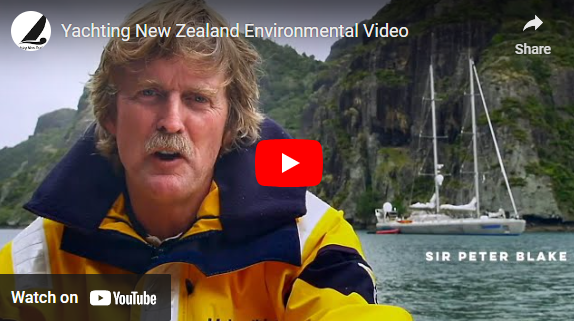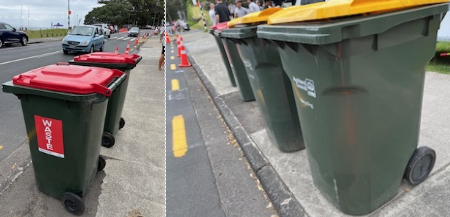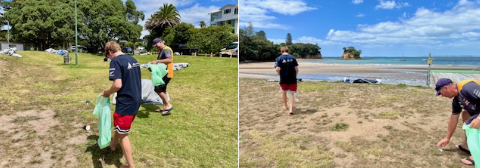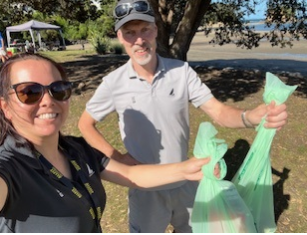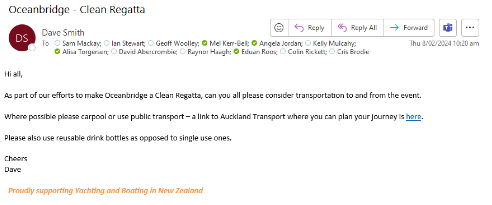Event Details | |
| Host | Yachting New Zealand |
| Location | USA |
| Certification Level | Gold |
Best Practices Achieved
1. Eliminate Single-Use Water Bottles and Provide Water Refill Stations
1. We had jugs and taps on hand for sailors to fill up their own water bottles. Glasses were available for use for those wanting one.
2. Eliminate Plastic Straws
2. No straws needed or provided at the event.
3. Serve Food with Plastic-Free Dinnerware
3. We served sausages and bread, so only need servettes. The Torbay Sailing club provided hotdogs and filled rolls, using paper plates only if requested.
For race officials and volunteers filled rolls were given out in brown paper (compostable) bags, apples and a muffin were also provided (see image above).
4. Skip Bags or Go Reusable
4. For beach clean we used Compostable bags (see above).
Food for people, in each boat, was put into a dry bag, which we recycle each regatta. Once the dry bag comes back at the end of the day, they got tokens which were exchangeable at the bar for a free drink.
6. Publicize Your Sustainability Efforts
6. Prior to the Oceanbridge regatta YNZ emailed out to sailors and staff about being a Clean Regatta. Ensuring that everyone did their bit to look after the environment.
7. Involve Local Organizations
RŪNĀ and Clean club was be advertised at this event. Our Education Lead (in charge of the RŪNĀ education programme) and Clean Club organiser, was able to discuss upcoming RŪNĀ events with clubs from around New Zealand. We were able to chat with club committee members about becoming a clean club member. Bookings for a school to experience a sailing day were made through this event.
The below video was also displayed in the club house.
https://youtu.be/M9h0jZG5OZ4
8. Post Educational and Reusable Signage
RŪNĀ and Clean club were going to use reusable tear drop flags and QR codes for people to obtain further information or to sign up. Unfortunately, these flags did not arrive on time. However, the TV was used to educating the sailors and spectators on the about being sustainable. What it is that Yachting New Zealand are doing to help clubs become more sustainable, offering techniques, advice, and rewards for their commitment to making their club/waterway sustainable.
9. Serve Local Food or Source Seafood Sustainably
We used a local butcher to purchase our sausages, and a local bakery to purchase our bread.
10. Organize a Green Team
Mel, Alisa, Dave, Sam.
11. Ensure Proper Waste Bin Placement and Signage
We had rubbish and recycling bins available around the venue. Signage on the bins and the colour lid is common for identifying what the bin is for (in NZ). YNZ staff regularly checked bins to ensure they were being used correctly, and bins moved to locations of high foot traffic (near coffee van & ice-cream truck).
12. Divert Food Waste from the Landfill
We had big bowls collecting in the watermelon rinds and food scraps that were then but into food caddies ready for curb side pickup by the council: Why we are collecting food scraps (aucklandcouncil.govt.nz)
https://www.aucklandcouncil.govt.nz/rubbish-recycling/food-scraps-collections/Pages/why-we-are-collecting-food-scraps.aspx
13. Use Paperless Event Management
The event was run digitally. All communication was made online or verbally.
14. Host a Beach or Marina Cleanup
Beach was monitored by YNZ staff and clean up at the end of the event was done by the participants.
18. Promote Alternative Transportation
YNZ staff were emailed to car-pool or use public transport to the event (see below). Several of the YNZ team, who did not need to use their cars for transporting boats or gear, managed to carpool to the event.
17. Offer Vegetarian or Vegan Alternatives
The local butcher will provide vegetarian/vegan sausages.
19. Reduce Day-of Emissions
Race Officials used “Mavis” an automated sound system for starting procedures, and Buoy Zone https://www.buoy.zone/ for race-course mark setting. All systems resulted in less paper. Results were emailed or text via phones to the club.
15. Prevent Toxins from Entering the Water
All rescue craft and committee boats were “water only” washed down in an area which has a filtration system with holding tanks. No contaminated products were allowed to be emptied back to the sea or in the surrounding rigging area.
20. Inspire Future Action
There were no support boats for this regatta, all boats were designated to a rescue, or committee boat role so the absolute minimum of boats were on the water. Smaller ribs were used for rescue boat role, rather than larger vessels, thus reducing emissions. The start boat, once on anchor, had all engines switched off until the end of the regatta.



